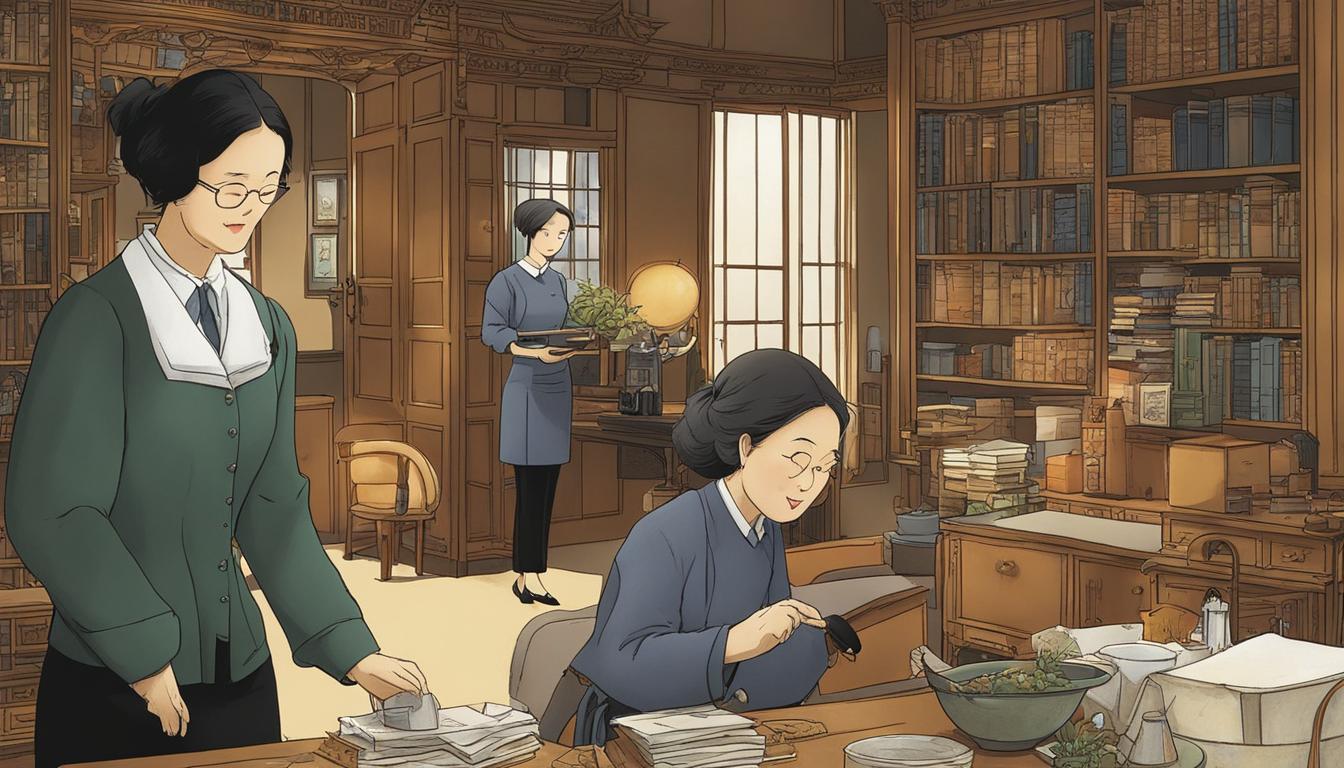Discover the captivating world of Yōko Ogawa’s novel, The Housekeeper and the Professor, as it takes you on a journey through the enchanting bond between a brilliant mathematician suffering from amnesia and a kind-hearted housekeeper and her son. Published in 2007, this thought-provoking book explores the profound connection between mathematics and love, shedding light on the intricacies of memory, emotions, and human relationships.
Key Takeaways:
- Yōko Ogawa’s The Housekeeper and the Professor tells the story of a mathematician with amnesia and his relationship with a housekeeper and her son.
- The novel explores the living world of mathematics, showcasing the unique characteristics and relationships of numbers.
- Amnesia and emotional connections are at the heart of the story, highlighting the capacity for relationships even in the absence of continuous memory.
- By contrasting views of amnesia with other works, the novel emphasizes the different ways amnesia can impact individuals and their emotional lives.
- The Professor’s philosophical perspective and the significance of Euler’s Identity add depth to the exploration of mathematical concepts in the book.
Mathematics as a Living World in The Housekeeper and the Professor
In the captivating novel The Housekeeper and the Professor, numbers are portrayed as living species with distinct characteristics and relationships. The mathematician protagonist firmly believes that numbers possess their own personalities and exhibit family resemblances. This unique perspective immerses readers in the fascinating world of mathematics.
The book explores rare numbers, hidden connections, and the discovery of new families, all of which contribute to the intricate web of mathematical relationships. Through the lens of the mathematician’s viewpoint, readers are invited to perceive mathematics as a living world, brimming with wonder and endless possibilities.
Amnesia and Emotional Connections in The Housekeeper and the Professor
The Housekeeper and the Professor introduces us to the intriguing concept of amnesia and its impact on emotional connections. The protagonist, known as the Professor, suffers from anterograde amnesia, which prevents him from forming new memories. Despite this challenge, he forms a deep and meaningful bond with the housekeeper and her son, transcending the limitations of his condition.
The novel delves into the idea of residual emotional instincts, highlighting the capacity for relationships even in the absence of continuous memory. The Housekeeper’s unwavering dedication and care for the Professor create a foundation of trust and understanding, allowing their connection to flourish every day. It showcases the resilience of human emotions and the power of genuine connection, even when the mind fails to retain past experiences.
This exploration of emotional connections in the face of amnesia gives readers a profound perspective on the complexities of human relationships. It challenges conventional notions of memory as a prerequisite for emotional bonds, suggesting that residual emotions and instincts can bridge the gap created by amnesia.
“Despite his amnesia, the Professor’s heart remembers. Our love transcends the boundaries of time and memory, creating an unbreakable bond,” says the Housekeeper.
This powerful quote from the novel beautifully captures the essence of the emotional connections forged in the story. It underscores the enduring nature of love and the ability to create lasting memories through shared experiences.
Recreating Relationships Every Day
The Housekeeper and her son must recreate their relationship with the Professor each day, introducing themselves and establishing familiarity anew. This repetitive process challenges traditional notions of continuity but also provides an opportunity for the characters to rediscover the bonds they share. It emphasizes the importance of the present moment and the immense capacity for connection, even in the absence of a continuous past.
Amidst the Professor’s condition, the emotional connections portrayed in The Housekeeper and the Professor resonate deeply, reminding us of the invisible threads that unite us as human beings. It is a testament to the power of empathy, compassion, and understanding in overcoming the barriers imposed by amnesia.
To visualize the emotional connections and the bond between the characters in The Housekeeper and the Professor, take a look at the image below:
Contrasting Views of Amnesia in The Housekeeper and the Professor and Man Walks Into a Room
The Housekeeper and the Professor by Yōko Ogawa presents a unique perspective on amnesia when compared to Nicole Krauss’ novel, Man Walks Into a Room. In Krauss’ book, the protagonist experiences a comprehensive loss of affection and affective ability due to amnesia, resulting in emotional detachment. On the other hand, the Professor in Ogawa’s novel retains some residual emotional instinct and the capacity for relationships despite his amnesia. This contrast highlights the different ways in which amnesia can impact individuals and their emotional lives.
Aristotelian vs. Platonist Philosophies in The Housekeeper and the Professor
The Housekeeper and the Professor delves into the contrasting philosophical perspectives of the characters, shedding light on the Aristotelian worldview of Samson Greene in Man Walks Into a Room and the Platonist beliefs of the Professor. While the Professor sees numbers as attributes of God, eternal, perfect, and uncreated, providing a spiritual continuity in his materially interrupted life, Samson Greene views memory as a necessary causal condition for emotions and experiences a loss of identity due to his amnesia.
“Numbers are not merely shapes or quantities, but they hold a deeper significance for me. They are attributes of God, eternal, perfect, and uncreated. I see in them the beauty and perfection that transcends the material world, offering a glimpse into the divine order.”
Through the contrasting perspectives of the characters, The Housekeeper and the Professor explores the philosophical implications of memory, identity, and the nature of existence. These divergent viewpoints provide readers with a thought-provoking exploration of the human experience and the interconnectedness of mathematics and philosophy.
Continue reading to discover the significance of Euler’s Identity in The Housekeeper and the Professor.
Euler’s Identity and its Significance in The Housekeeper and the Professor
Towards the end of the book, the Professor writes Euler’s Identity, a formula celebrated as the most beautiful in mathematics. This formula synthesizes different mathematical universes, showcasing the connections among transcendental, imaginary, natural, and irrational numbers. The significance of Euler’s Identity lies in its representation of the synthesis of worlds and the profound insight it provides into the interconnectedness of mathematical concepts.

The Plot and Characters of The Housekeeper and the Professor
The Housekeeper and the Professor is a captivating novel that revolves around the interactions between three central characters: the Professor, a mathematician suffering from amnesia, the Housekeeper, and her son, Root. The narrative explores the evolving relationship between these characters, infused with the Professor’s deep love for mathematics and their shared passion for the Hanshin Tigers baseball team.
The Professor’s amnesia, which limits his memory to just 80 minutes, adds a unique dynamic to the plot. Each day, he must reacquaint himself with the Housekeeper and Root, creating a sense of rediscovery and novelty in their interactions. As the story progresses, their bond deepens, and they form a unique family unit built on trust, patience, and shared experiences.
Amidst the backdrop of their personal journey, the novel beautifully weaves in the emotional impact of the Professor’s love for mathematics. His passion for numbers and his unwavering dedication to his field despite his memory limitation serves as an inspiration for the Housekeeper and Root, who develop their own appreciation for the beauty and intricacies of mathematics.
“Mathematics is not just a language. It’s a way of thinking. It’s a realm where everything is connected, and possibilities are limitless.”
The Housekeeper and the Professor is not solely centered around the main characters. Supporting characters like the Sister-in-Law and the Widow contribute to the depth and complexity of the narrative. Each character brings their own unique perspective and plays a significant role in shaping the story’s themes of companionship, memory, and the power of human connections.
As readers delve into The Housekeeper and the Professor, they are drawn into a world where the boundaries of memory are transcended by the power of love, shared experiences, and the enduring spirit of mathematics. It is a tale that highlights the inherent beauty in the connections we make and the lasting impact they can have on our lives.
Mathematical Terminology in The Housekeeper and the Professor
The Housekeeper and the Professor, a captivating novel by Yōko Ogawa, skillfully integrates various mathematical terms and concepts throughout the narrative. These mathematical elements serve to enhance the themes and ideas explored in the story and provide readers with a deeper understanding of the emotional connections between the characters.
Ogawa incorporates mathematical terminology such as the square root, which represents the inverse operation of squaring a number. This concept is essential in understanding the relationships between numbers and their roots. Additionally, the novel delves into imaginary numbers, which are denoted by the symbol “i.” Imaginary numbers play a significant role in mathematics and represent numbers that cannot be expressed as real numbers.
Prime numbers, another mathematical concept featured in the story, are numbers that can only be divided by one and themselves, such as 2, 3, 5, and so on. The Housekeeper and the Professor explores the significance of prime numbers and their role in establishing connections between characters and events.
Perfect numbers are also touched upon in the novel. These numbers have the special property of being equal to the sum of their divisors. The Housekeeper and the Professor showcases the elegance and allure of perfect numbers and demonstrates how they contribute to the overarching themes of love and connection in the story.
Another intriguing mathematical concept presented in the book is that of amicable numbers. Amicable numbers are pairs of numbers that have the unique property of the sum of their divisors being equal to the other number in the pair. The inclusion of amicable numbers adds a layer of complexity to the narrative and emphasizes the interconnectedness of the characters’ lives.
Ogawa’s deliberate use of mathematical terminology throughout The Housekeeper and the Professor not only enriches the story but also emphasizes the profound connections that exist between mathematics, memory, and human relationships. These mathematical elements serve as a vehicle to explore the deeper themes of the novel, providing readers with a unique and thought-provoking reading experience.

The Impact of Memory in The Housekeeper and the Professor
The concept of memory plays a significant role in The Housekeeper and the Professor. The protagonist’s limited memory, lasting only 80 minutes, affects his daily life and relationships. The book delves into the nature of memory, highlighting its impact on identity, emotions, and the formation of new bonds.
“Our memories are like a housekeeper who’s busy tidying up all the time,” the Professor mused. “She’s forever putting things in order, but there’s always more clutter to sort.”
The exploration of memory adds layers of complexity to the narrative, creating a poignant reflection of the human experience. The story examines how memory shapes our perceptions of ourselves and others, influencing the bonds we form and the emotions we feel.
The Film Adaptation of The Housekeeper and the Professor
The Housekeeper and the Professor, a beloved novel written by Yōko Ogawa, was not only a literary success but also inspired a captivating film adaptation. Released in January 2006 and directed by Takashi Koizumi, the film beautifully captures the essence of the original work while providing a unique perspective on the story.
The adaptation remains faithful to the novel, staying true to its core themes and characters. However, it also offers a slightly different perspective by focusing on “Root,” the housekeeper’s son, and his memories of the Professor. Through this lens, the film delves deeper into certain aspects of the story, providing new insights and exploring the intricate relationship between the Professor and the Widow.
The film adaptation of The Housekeeper and the Professor is a visual and emotional journey that beautifully captures the heartwarming bond between the characters. It allows viewers to experience the magic and depth of the original novel in a new and captivating way. For fans of the book, the film provides an opportunity to see their favorite story come to life on the screen.
The Literary and Philosophical Significance of The Housekeeper and the Professor
The Housekeeper and the Professor by Yōko Ogawa is not just a captivating work of fiction; it delves into profound metaphysical questions, exploring the complexities of existence, memory, emotions, and the nature of relationships. The novel’s literary significance lies in its ability to provoke thought and contemplation, challenging readers to examine fundamental aspects of the human experience.
One of the key elements contributing to the novel’s literary depth is the exploration of contrasting philosophical perspectives. Through the characters of the Professor and Samson Greene in Man Walks Into a Room, the book presents the conflict between the Professor’s Platonist worldview, where numbers are eternal and perfect attributes of God, and Samson’s Aristotelian ideology, which emphasizes the role of memory in defining identity. This dichotomy offers readers an opportunity to ponder the nature of reality, knowledge, and the interconnectedness of mathematics and human existence.
The theme of amnesia further enhances the literary significance of The Housekeeper and the Professor. The portrayal of the Professor’s anterograde amnesia raises profound questions about the nature of memory and its impact on relationships. Despite his limited memory lasting only 80 minutes, the Professor forms a deep emotional connection with the housekeeper and her son. This exploration of the resilience of emotions and the capacity for connection in the face of memory loss adds layers of complexity to the narrative.
Moreover, The Housekeeper and the Professor embraces the significance of mathematics as a philosophical and metaphorical tool. The world of numbers comes alive, with Ogawa presenting numbers as living beings with distinctive characteristics and relationships. This metaphorical portrayal not only enhances the narrative but also provides a platform to examine the intricate connections between mathematics and human emotions, highlighting the universal language that transcends traditional boundaries.
The literary and philosophical significance of The Housekeeper and the Professor lies in its ability to engage readers on multiple levels, invoking introspection and contemplation. By delving into metaphysical questions, exploring contrasting perspectives, and illuminating the interconnectedness of mathematics and human emotions, Yōko Ogawa crafts a novel that resonates long after the final page is turned.
Quotes:
“The contrasting philosophical perspectives in The Housekeeper and the Professor offer a glimpse into the intricate relationship between knowledge, memory, and existence. It challenges readers to question the nature of reality and the interconnectedness of mathematical concepts with the human experience.”
– Literary Critic
Key Takeaways:
- The Housekeeper and the Professor surpasses being a charming piece of fiction, engaging with profound metaphysical questions.
- The contrasting philosophical perspectives and exploration of amnesia contribute to the novel’s literary significance.
- The significance of mathematics as a metaphorical and philosophical tool adds depth and complexity to the narrative.
The Reception and Success of The Housekeeper and the Professor
The Housekeeper and the Professor, written by Yōko Ogawa, garnered widespread acclaim and achieved remarkable success following its release. The novel captivated readers, earning both critical and commercial recognition in Japan.
Within a mere two months after its paperback release, The Housekeeper and the Professor sold one million copies—an extraordinary feat in the literary world. Its popularity can be attributed to the unique combination of mathematics, storytelling, and emotional depth that resonated with readers of all backgrounds.
“The Housekeeper and the Professor is a truly remarkable work—insightful, heartwarming, and brilliantly crafted. Yōko Ogawa’s talent shines through every page, taking readers on a poignant journey of love, friendship, and the power of memory.”
– Literary Critic
Notably, The Housekeeper and the Professor received the prestigious Hon’ya Taisho award, further solidifying its reputation as a literary masterpiece. The recognition from this esteemed accolade highlighted the novel’s exceptional storytelling and profound exploration of complex themes.
The success of The Housekeeper and the Professor extended beyond the pages of the book, as it was adapted into a successful film. Directed by Takashi Koizumi, the film offered a fresh perspective on the story, emphasizing the memories of the character Root, played a vital role in the narrative.
The Housekeeper and the Professor’s enduring popularity and critical acclaim reaffirm its position as a beloved work of literature. Its ability to capture the hearts and minds of readers is a testament to Yōko Ogawa’s exceptional talent and the universal appeal of its themes.

As the journey through The Housekeeper and the Professor comes to an end, it is clear that this captivating novel has left a lasting impression on both literary enthusiasts and casual readers alike. Its reception and success have solidified its place as a cherished piece of literature, etching its name in the annals of contemporary Japanese fiction.
Conclusion
The Housekeeper and the Professor by Yōko Ogawa is a captivating novel that combines the beauty of mathematics with the complexities of memory and human relationships. Through the poignant journey of the characters, Ogawa explores profound philosophical questions, offering readers a unique perspective on the interconnectedness of love, mathematics, and the human experience.
By skillfully weaving together themes of memory, emotions, and the significance of numbers, Ogawa creates a thought-provoking narrative that lingers in the minds of readers long after they have finished the book. The Housekeeper and the Professor is a testament to Ogawa’s storytelling prowess, as she expertly combines literary depth with the intrigue of mathematical concepts.
With its ability to engage both literature enthusiasts and mathematics aficionados, The Housekeeper and the Professor offers a truly enriching reading experience. Ogawa’s exploration of the profound connections between numbers, memory, and human emotions is both intellectually stimulating and emotionally resonant. Whether you are captivated by the beauty of mathematics or drawn to stories that delve into the intricacies of human relationships, The Housekeeper and the Professor is a must-read that immerses you in a world of profound insights and heartfelt emotions.
FAQ
What is "The Housekeeper and the Professor" about?
“The Housekeeper and the Professor” is a captivating novel by Yōko Ogawa that explores the bond between a mathematician with amnesia and a kind-hearted housekeeper and her son. The story delves into the profound connection between mathematics and love, shedding light on memory, emotions, and human relationships.
How does the book portray numbers?
In the book, numbers are portrayed as living species with distinct characteristics and relationships. The mathematician protagonist believes that numbers have personalities and family resemblances. The novel explores the fascinating world of mathematics, including rare numbers, hidden connections, and the discovery of new mathematical relationships.
What is the significance of amnesia in the novel?
The Professor in the novel suffers from anterograde amnesia, inhibiting the creation of new memories. Despite this, he develops a deep emotional bond with the housekeeper and her son, even though he has to re-create this relationship every day. The book explores the idea of residual emotional instincts and the capacity for relationships, even in the absence of continuous memory.
How does "The Housekeeper and the Professor" compare to "Man Walks Into a Room" in terms of amnesia?
“The Housekeeper and the Professor” presents a different perspective on amnesia compared to “Man Walks Into a Room.” While the protagonist in the latter experiences comprehensive emotional detachment and a loss of affection, the Professor in Ogawa’s book retains some level of residual emotional instinct and the capacity for relationships. This contrast highlights the different impacts amnesia can have on individuals and their emotional lives.
What contrasting philosophical views are explored in the novel?
“The Housekeeper and the Professor” explores the Professor’s Platonist perspective and Samson Greene’s Aristotelian worldview in “Man Walks Into a Room.” The Professor sees numbers as attributes of God, eternal, perfect, and uncreated, providing spiritual continuity. Samson, on the other hand, views memory as a necessary causal condition for emotions and experiences a loss of identity due to his amnesia.
What is the significance of Euler’s Identity in the book?
Towards the end of the book, the Professor writes Euler’s Identity, a formula celebrated as the most beautiful in mathematics. This formula showcases the connections among transcendental, imaginary, natural, and irrational numbers. It represents the synthesis of worlds and offers profound insight into the interconnectedness of mathematical concepts.
Who are the main characters in "The Housekeeper and the Professor"?
The novel revolves around the interactions between a mathematician with amnesia referred to as the Professor, a housekeeper, and her son named Root. Additional characters such as the Sister-in-Law and the Widow add depth and complexity to the story.
How does the book incorporate mathematical concepts?
“The Housekeeper and the Professor” incorporates various mathematical terms and concepts, including the square root, imaginary numbers, prime numbers, perfect numbers, amicable numbers, and more. These elements are used to weave a deeper understanding of the themes and ideas explored in the story.
What is the role of memory in the novel?
Memory plays a significant role in “The Housekeeper and the Professor.” The limited memory of the protagonist, lasting only 80 minutes, affects his daily life and relationships. The exploration of memory adds layers of complexity to the narrative and offers insights into identity, emotions, and the formation of new bonds.
Has "The Housekeeper and the Professor" been adapted into a film?
Yes, “The Housekeeper and the Professor” was adapted into a film released in January 2006. Directed by Takashi Koizumi, the film captures the essence of the novel while providing a slightly different perspective by focusing on “Root”‘s memories of the Professor. The movie delves deeper into certain aspects, such as the relationship between the Professor and the Widow.
What is the literary and philosophical significance of the novel?
“The Housekeeper and the Professor” goes beyond being a charming piece of fiction, tackling profound metaphysical questions about existence, memory, emotions, and the nature of relationships. The contrasting philosophical perspectives, exploration of amnesia, and the significance of mathematics all contribute to the literary and philosophical depth of the novel.
How was "The Housekeeper and the Professor" received?
“The Housekeeper and the Professor” received critical acclaim and commercial success in Japan, selling one million copies in just two months after its paperback release. The novel won the Hon’ya Taisho award and was adapted into a successful film. Its unique blend of mathematics, story, and emotional depth resonated with readers and solidified its place as a beloved work of literature.
What is "The Housekeeper and the Professor" about?
“The Housekeeper and the Professor” by Yōko Ogawa is a thought-provoking novel that explores the intricacies of memory, relationships, and the beauty of mathematics. Through its compelling characters and their emotional journey, the book delves into profound philosophical questions and offers readers a unique perspective on the connections between mathematics, love, and the human experience. Ogawa’s storytelling and nuanced exploration of themes make “The Housekeeper and the Professor” a must-read for lovers of literature and mathematics alike.



